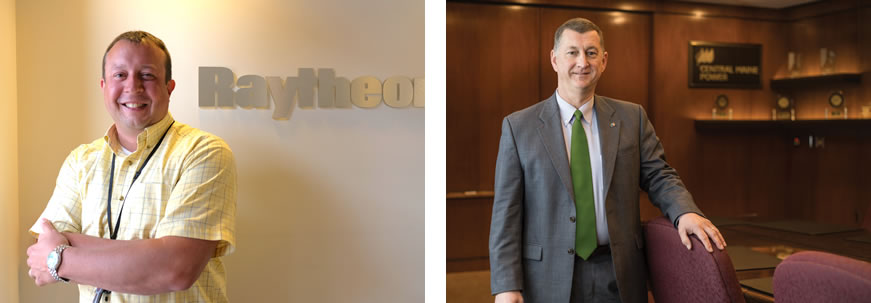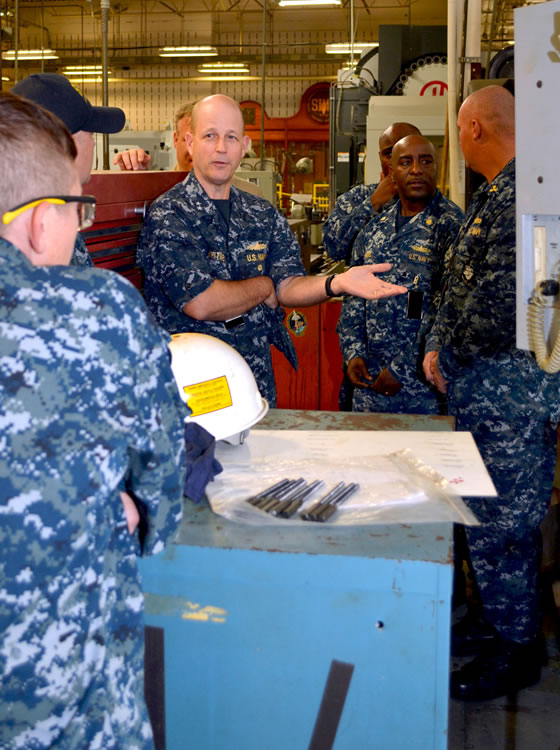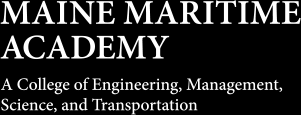It comes down to basics. You learn how to follow—and how to do so responsibly—before you are given the responsibility for leadership of others.
This happens through experience in the Regiment, training on the MMA vessel fleet, classroom projects and labs, athletics, cooperative education programs and internships, student government…the complete list entwines almost every major endeavor while you are a student into a virtual rope inside you that may fray but never breaks when you are called upon to take charge.
The more senior you become as a leader, the more consequences there are when your words and actions are not closely aligned.
Rear Adm. Mark Whitney ’84 has served in the U.S. Navy for more than 34 years, presently as Fleet Maintenance Officer for Fleet Forces Command, and says, “Maine Maritime Academy instilled in me a leadership principle that I do not fail to follow: I never expect anyone to do something I would not do myself and, more aptly, have not done myself already. This has served me well in my career.”
Below are some other key qualities of good leadership that Whitney esteems:
Humility: helping people to feel safe in being open with you and providing honest feedback because there is no fear of your positional power.
Trust: being credible and reliable so that people feel an emotional connection with you, as well as a belief that you are focused on making the team successful versus being selfishly motivated.
Active listening: reinforcing how people feel their input is being received and incorporated into your thinking.
Empowering others: understanding the power of letting go, that not all information and decisions rest with you.
Tact: the art of making difficult decisions without using negative emotions or traits like yelling and profanity.
Patience: being the calm in the storm and developing the ability to resist impulsive and reactive decisions.
Following are the experiences, achievements and advice of those who we asked to define leadership.
Motivate
Marine Engineering Technology
Bradley exemplified leadership while at MMA as the women’s soccer captain, Female Athlete Leader of the Year and Senior Scholar Athlete of the Year 2018. She was NROTC MIDN Operations Officer, Regimental Master at Arms and much more.
“I define leadership as the ability to motivate a person or group to accomplish a task, whether it’s convenient or not, and whether they want to or not.
“Finding ways to motivate others is the most difficult aspect of being a leader. It’s easy to order someone around if they have to do what you say, but it’s a challenge to have an individual want to follow and go beyond the basic assignment. This aspect has been a key focus on what I’ve tried to do as a leader at MMA.”
How has the MMA experience enhanced Bradley’s leadership ability?
“NROTC promotes that we know our people, take care of our people, and breed trust throughout our command/unit.

Kylie Bradley ’18 says motivating others is key to good leadership.
“The regiment is also a unique leadership lab. As a physical training instructor, training staff person and Master at Arms, I learned a great deal of patience dealing with students who might not always want to buy in to the way of life in the regiment.
“I also learned a lot from the In Command Leaders Programs, which brought in some really cool speakers to give more perspectives on leadership styles and approaches to leadership than we are able to experience at MMA.”
Understanding
MMA Continuing Education Instructor
Standards of Training, Certification and Watchkeeping (STCW) code has brought forth new requirements for deck and engineering officers, specifically leadership, management and teamwork skills.
Achorn created MMA’s continuing education course, Leadership Management Skills according to IMO guidelines that lead participants to a USCG certificate to maintain licensed status. The course is a blended online and in-class experience. An individual can participate in the online portion from anywhere in the world and progress at his/her own pace and then come to Castine for a one-day session and receive his/her certificate.
A great leader is one who can provide clear, concise objectives.
“Embedded in this training are various means to assist individuals to be better communicators,” says Achorn. “The aim is to enhance participants’ ability to be comfortable using assertiveness in the proper ways, both as a leader and as a subordinate. Key to it all is understanding the different attitudes and styles of management and leadership. “Once the participants of the course land in the one-day session here on campus, they have gone through 90% of my material, and they wrap it all together and convey through discussion those differences between being a leader versus a manager.
“A great leader is one who can provide clear, concise objectives so his/her team can perform without hesitation or confusion. He/she is someone who says, ‘We are going this way…’ and leads them with inspiration. A great leader understands that people are of importance. Most of all, they know they may not have certainty at all times, but they have built a great team to work with and they back them up.”
Create Change
Marine Science and Small Vessel Operations
Davidson is a senior resident assistant, but in his freshman year he lived in what he calls a “trouble section” in the residence hall. He also observed that there were students in the greater community who were “driven by the quest for money, and I wanted to create fertile ground for the student community to grow and find their passion.”
“That experience at MMA, more than any other, has helped me become a leader because I wanted to see the community go down the right path and I wasn’t going to wait for someone else to do it.
“My hope is that when I leave the academy, my positive efforts and impact will continue to ripple through the campus for years to come.”
Davidson’s one lament regarding his leadership development while at MMA: “Time management. The past four years seemed to slip by so quickly, and it always seems there isn’t enough time in the week during school.”
He defines leadership as: “Being an influential role model in society and creating change in your community with your actions.”
His advice to others who are interested in being good leaders?
“Get involved as soon as you can because time at MMA goes by quickly!
“And as Gandhi said, ‘Be the change you want to see in the world.’”

Good leaders adapt their methods to given situations. These four personify those qualities: (shown top left to bottom right) Tim Achorn ’79, Chase Davidson ’19, Tina Vanderploeg ’92 and Rylee Knox ’18
Confidence
Owner, Mobile Maritime Training, LLC
After more than 20 years as a contract mariner with the Military Sealift Command, Vanderploeg retired and now provides safety, physical security and firearms training to merchant mariners, and serves as Maritime Accident Investigator for The New Jersey Maritime Pilot and Docking Pilot Commission.
She worked her way up from third mate to captain within the first 10 years of her career, becoming the first female captain of an LMSR-class vessel, and rose to the rank of LCDR in the U.S. Navy Reserve.
“Leadership,” she says, “is the ability to motivate others to achieve their full potential with the ultimate goal of achieving a working team. The leader can create the team by understanding and utilizing each individual’s strengths. Building confidence and trust with each team member enables a good leader to delegate responsibilities.
“The team must also trust the leader. Honesty and good communication are necessary to achieve the ultimate goal. The leader who promotes creativity and results is the motivation and the inspiration of the team, not just someone who tells others what to do.”
The key words that Vanderploeg uses to define leadership:
“Delegation: In my experience, people perform better if they are not micromanaged. By delegating responsibility and the support needed to achieve a task, you give others the chance to achieve their full potential and creativity.
“Confidence: To delegate responsibilities, there must be a level of confidence in each member of your team. However, you should also have enough confidence in your own decisions and abilities for your team to trust you as a leader. You must gain the respect of the team by showing confidence.”
Inspire
Marine Systems Engineering
Knox’s leadership experience as an MMA student spans from being president of both the Student Government Association and the Student Mariners Society to being an MMA Alumni Association Student Director, a 2nd Class Stryker, a 3rd Class Mentor and more.
He defines leadership as “both action that inspires and wisdom that leverages the aptitude of individuals to achieve.”
The key word he advocates for good leadership: inspire.
“When I look at the people in my life whom I would like to follow into a challenging situation, they all have one thing in common: their actions and personal conduct give context to their leadership. You must lead within the context of your own character.
“I have learned that there is no title or authority that can cause a team to follow a leader with the same loyalty as is derived from the admirable character of a leader. This is the principle that I try to live by.
“MMA has given me a platform to strengthen my leadership skills through direct experience.
“I had the distinct honor of leading the student body in professional conversations with the administration about freedom of expression through arguably one of the most controversial and emotionally charged elections in our nation’s history.
“This experience taught me that there is real value in taking time to honestly listen to the opinions of others, and consider situations from the position of those who disagree with you.”
Trust
Sr. Principal Engineer Logistics Specialist
Raytheon Company
As the first graduate of the MMA International School of Business and Logistics, Valliere started work two days after commencement, and in less than 10 years he has progressed to working as a lead logistics member on the shipboard test team of the DDG 1000 Zumwalt Program at Bath Iron Works. The Zumwalt is referred to as a 21st-century destroyer, and the ship is laden with advanced technology and capabilities that call for high-caliber teamwork and leadership.
“We have all been led by leaders who we respect,” says Valliere, “and some leaders who have disillusioned us. We learn from both.
“Leaders know, listen and trust their team. Leaders know what is best for the team, not themselves. Sometimes, leaders need to be good followers. Respected leaders must be ethical in their practices.

MMA provides a solid foundation for leaders, say Joseph Valliere ’99 and Doug Herling ’85.
“My leadership evolution continues. With more personal experience and by working for several different leaders over the past two decades, I continue to learn from each encounter. Every situation or challenge leads me back to my leadership toolbox.
“I keep some tools, I sharpen some, and if a tool is broken or worn out I discard it. I also borrow and lend tools to and from other leaders. I have made my share of mistakes and learned from them, and a couple of those mistakes led to what are now power tools in my toolbox.”
Approachability
President and CEO, Central Maine Power Company
Herling started at Central Maine Power (CMP) as an operator at the company’s oil-fired generator in Yarmouth shortly after graduation from MMA. He has worked his way through various management positions during the past 33 years, including Vice President of Engineering and Asset Management, Vice President of Special Projects, and most recently, Vice President of Electric Operations, before being appointed to his present position.
A lot of people have quite complicated things to say about leadership. To me, it is about being credible.
His experience at MMA, he says, prepared him well for a leadership role. “It may sound contradictory,” he notes, “but from day one as a MUG, understanding the importance of following orders builds a real sense of appreciation for good leaders. Learning how to prioritize by managing multiple assignments and knowing the value of teamwork were all critical life and professional lessons learned at MMA.”
Keys to good leadership:
“By being approachable I find I am able to build productive relationships with my team that are built on trust,” he says. “To me it is about being credible. If you don’t have credibility with your team, your customers and your other stakeholders, you cannot be successful.
“You need to be able to tell people where they are going before you can expect them to help you get there,” says Herling. “An organization’s vision determines a common definition of success and prosperity that all members of the team can buy into, and to which they can contribute.”█
Photos: Billy Sims, courtesy of alumni pictured






Post Comment
Comments are moderated and will be reviewed prior to posting online. Please be aware that when you submit a comment, you agree to the following rules:
Maine Maritime Academy reserves the right to delete any comment that does not comply with these guidelines and is not responsible or liable in any way for comments posted by its users. If you have a message for the editor, please email mariner@mma.edu.
Features
View All >Read More
Read More